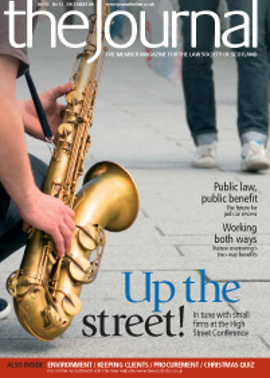Book reviews
The “BAD Act” has the unenviable record, hopefully never to be surpassed, of being the longest Act to be passed by the Scottish Parliament. It contains parts which will require conveyancers, litigators, banking and insolvency lawyers to get to grips with it, and all of them will appreciate the help received from Nicholas Grier’s annotations.
In a focused way he has taken the time to explain the background to each area, the issues which have caused legislation to be needed, and in many cases the political aspects as well. The BAD Act amends the bankruptcy regime, introduces bankruptcy registration orders and undertakings, sets up a new register of floating charges, provides for the creation of the Scottish Civil Enforcement Commission (to regulate judicial officers, the intended name for sheriff officers and messengers-at-arms), creates the new diligences land attachments, residual attachments and money attachments, abolishes some rarely used diligences, fundamentally amends others and makes numerous other minor changes.
The annotations in each area will help the reader to understand the changes and the flow of the sections in a clear and precise way. Where the wording of any section lacks clarity or could be considered ambiguous, the author explains his view of the meaning and why he has reached that view, and is to be applauded for doing so. Court lawyers will find this characteristic particularly helpful in the diligence sections.
As with so much recent legislation, a lot of the detail is in subsequent statutory instruments, and references to these and the appropriate forms have been painstakingly added.
The writer helpfully points out some parts of the Act which may never come through to be actual law (e.g. the Scottish Civil Enforcement Commission), and areas where changes in other legislation will need to be implemented, or are likely to be implemented before some sections of the Act will be bought into force (e.g. changes to avoid the apparent dual registration of a floating charge in the charges register and the new register of floating charges). His explanation of the problems that will arise if these sections are implemented before such other changes are made clearly sets out the chaotic position that will result, and will surely mean that no one would be stupid enough to let that happen.
If I were to have any criticism it would be in relation to some of the background reasons he sets out for the need to introduce the register of floating charges and the history of floating charges, but these points do not relate to the BAD Act and it would be churlish of me to detract in any way from Mr Grier’s excellent annotations. I would recommend this annotated version of the Act as the essential starting point for anyone researching these areas of law, be they a law student or a seasoned practitioner, in the same way that as an insolvency solicitor I always start bankruptcy research with my well thumbed copy of Bill McBryde’s annotations on the Bankruptcy (Scotland) Act 1985 and then work through the many subsequent changes.
In this issue
- Sale and purchase agreements – how to avoid the unexpected
- 2008: a year of change; 2009: a year for progress
- Law: it's the business
- Business makeover
- Training plus
- Registers update
- Public service
- One of a kind
- Brussels sprouts more eco-law
- Test yourself
- Trainees try again
- Terms of Business Guidance Note (November 2008)
- Guideline: Scanning and Archiving Documents (November 2008)
- Client, or customer?
- The changing faces of fraud
- Business advice roundup
- The year that crunched
- The anatomy of law firm failures
- Chapter and verse
- The power of agreement
- Under a cloud
- Scottish Solicitors' Discipline Tribunal
- ECJ in the fast lane
- Website review
- Book reviews
- Tender trouble
- Opportunity beckons, Smart tells symposium
- Public money or bust?






